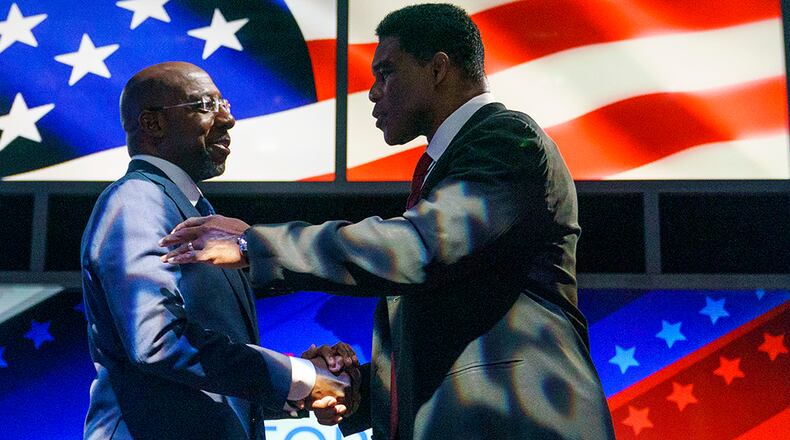A new poll focusing on the Dec. 6 runoff between U.S. Sen. Raphael Warnock and Republican Herschel Walker shows a close race with challenges for both rivals as they rush to rebuild their coalitions.
The poll, commissioned by the AARP, pegged Warnock at 51% and Walker at 47% — within the margin of error of 4.4 percentage points.
Conducted by the bipartisan team of Fabrizio Ward & Impact Research, it’s the first major public poll since the Nov. 8 election ended with neither rival securing the majority vote needed for an outright victory.
“Let’s state the obvious: No one knows who is going to come out to vote on Dec. 6,” said John Anzalone, who is perhaps best known as President Joe Biden’s pollster. “But we also learned something about the motivation levels that’s driving people to the polls.”
Warnock leads voters between the ages of 18 and 49 by a 24-point margin. But Walker has a 9-point edge among voters older than 50. The poll indicates that 90% of those older voters are “extremely motivated.” About three-quarters of voters younger than 50 say they share that intensity.
“If Warnock wins this race, it’s because younger voters actually turn out,” said Bob Ward, another pollster. “The age gaps here are staggering. Even though younger voters are a smaller share of the electorate, they’re keeping Warnock afloat.”
Each of the candidates is winning his own party’s voters, an important sign for Walker, who was hobbled in the midterm by split-ticket voters who backed Gov. Brian Kemp but withheld their support for him.
But the poll showed Warnock has a commanding lead of 54% to 39% over Walker among independent voters — an important bloc that once reliably voted for Republicans in Georgia.
“Independents are going to be about 30% of the electorate. That doesn’t mean all of them are up in the air,” Ward said. “But there’s a big group of voters who are middle-of-the-road, and many are going to show up in a lower-turnout election.”
The poll also indicated the gender gap that helped shape the last phase of the race hasn’t subsided. Warnock leads Walker among women by 11 points, while Walker has a 5-point advantage among men.
Warnock’s image is slightly positive, with 51% giving him a favorable review compared with 45% unfavorable. Walker is slightly underwater, with a 45% favorable rating and 49% unfavorable reviews.
The survey indicated why Warnock continues to distance himself from Biden — and why Walker wants to make the race a referendum on the Democratic president’s record. His approval rating is underwater at 43% and slightly lower among voters age 50 and over.
Older voters were particularly concerned about generational-high inflation, threats to democracy and challenges facing Social Security and Medicare programs.
About two-thirds said they were more likely to back a candidate who supports shielding Medicare from budget cuts and allowing the government program to negotiate for lower prescription drug prices.
Read the entire survey here:
About the Author
The Latest
Featured




